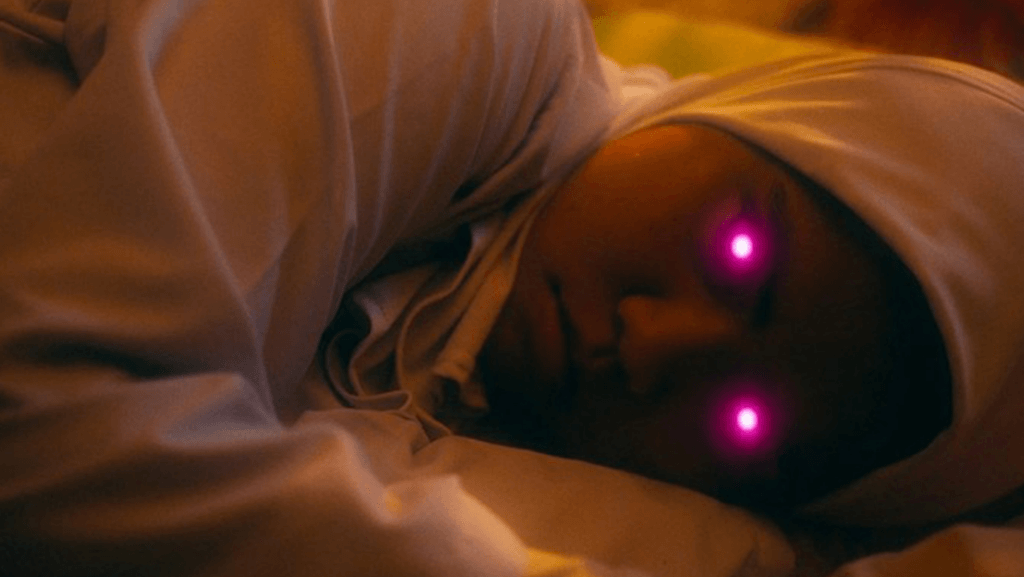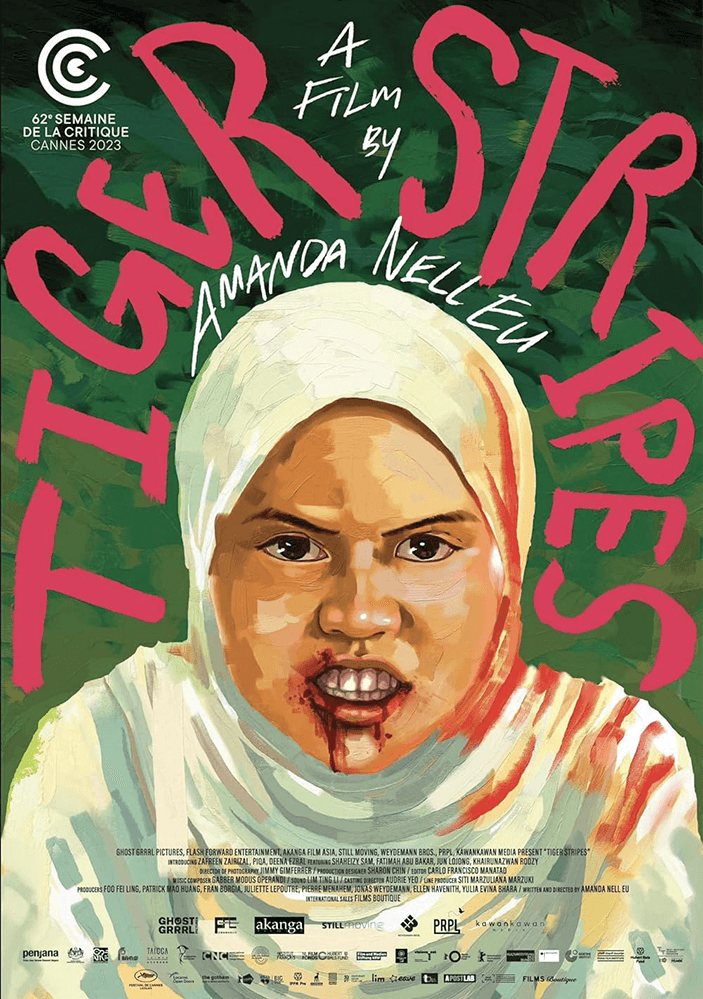
Tiger Stripes
By Brian Eggert |
For most of us, puberty comes with plenty of awkward moments and even emotional scars that last into adulthood. The body changes. Hormones flare. Everything is confusing. Adolescence marks the arrival of bad skin, strange smells, weird hair, confounding emotions, and a prevailing sense of embarrassment and humiliation. But for Zaffan (Zafreen Zairizal), the 12-year-old protagonist of Tiger Stripes, this time also involves growling, whiskers, claws, and a tail. Not dissimilar from last year’s Are You There God? It’s Me, Margaret., Malaysian writer-director Amanda Nell Eu’s thoughtful coming-of-age story considers young womanhood as a form of body horror in Zaffan’s Islamic community, where her physical transformation is an allegory for the challenge of embracing one’s individuality and rebellious streak in the face of demonization. Shrewdly avoiding any outspoken Islamaphobic messages, it remains a stirring account of female empowerment, where the Southeast Asian setting’s specificity bolsters the universality of the narrative.
When the film opens, Zaffan is already a non-conformist. She doesn’t like wearing her head scarf but enjoys making TikTok dance videos and testing out a bra, which defies her community’s strict expectations for young girls to be reserved, their bodies contained and out of sight. Everything about her culture tells Zaffan that her behavioral instincts are wrong. In her English-language class, she learns basic phrases reinforcing cultural expectations, such as “The father goes to work” or “The mother cooks at home.” At home, her father is a passive nonentity, while her mother is a disciplinarian who constantly questions Zaffan’s behavior. So when Zaffan becomes the first girl in her class to get her period, it’s perceived as another example of her unorthodoxy. Her friends Farah (Deena Ezral) and Mariam (Piqa), particularly the former, ostracize and tease her, calling her a “slut” for the natural process she’s experiencing. But they don’t know the full extent of Zaffan’s changes, ranging from her hands turning into animal-like claws to her sudden hunger for a fresh kill. Their worst fears seem to come true as Zaffan’s condition spreads to others like a disease.
Nell Eu, who grew up in Kuala Lumpur and studied filmmaking at the London Film School, says in the press notes that most of the Malaysian folklore she grew up with consisted of cautionary tales about monsters and nonconforming, usually involving strong women who were not traditionally beautiful or behaved differently and so were outcast. “There are so many powerful structures in a young girl’s life that govern and suppress what every woman essentially has in her, this wild nature,” she writes. Her story reconsiders the lessons her people tell children, especially young girls, which shapes how they feel about their bodies. The parable at the film’s center is one about championing what makes a person unique, as opposed to curbing differences to conform to, in this case, Malaysia’s official religion, Islam. But the lesson applies to any religion or culture that expects compliance to gender and social roles. This story is not so different from Carrie (1976), where puberty marks the arrival of new powers that materialize in sometimes horrific ways.
 The director’s message faced scrutiny from the Film Censorship Board of Malaysia because of its depiction of Islam and a repressive culture for girls. That’s partly why independent producer Foo Fei Ling’s company Ghost Grrrl Productions sought international co-production from companies in France, Germany, Indonesia, the Netherlands, Qatar, Singapore, and Taiwan—to ensure an audience outside of Malaysia. Inevitably, the censor board edited the Malaysian version of Tiger Stripes, and Nell Eu has since renounced that cut, leaving the director to focus on her uncut film’s gradual rollout across the globe. After debuting at the Cannes Film Festival in 2023, Tiger Stripes arrives in the United States and supplies a familiar kind of metaphor of bodily repression, putting the feature in the same category as Jacques Tourneur’s Cat People (1942).
The director’s message faced scrutiny from the Film Censorship Board of Malaysia because of its depiction of Islam and a repressive culture for girls. That’s partly why independent producer Foo Fei Ling’s company Ghost Grrrl Productions sought international co-production from companies in France, Germany, Indonesia, the Netherlands, Qatar, Singapore, and Taiwan—to ensure an audience outside of Malaysia. Inevitably, the censor board edited the Malaysian version of Tiger Stripes, and Nell Eu has since renounced that cut, leaving the director to focus on her uncut film’s gradual rollout across the globe. After debuting at the Cannes Film Festival in 2023, Tiger Stripes arrives in the United States and supplies a familiar kind of metaphor of bodily repression, putting the feature in the same category as Jacques Tourneur’s Cat People (1942).
Although, given the body horror elements and blood on display, perhaps Nell Eu’s film has more in common with Paul Schrader’s 1982 remake, Cat People, with a hint of the B-movie cheapness seen in Sleepwalkers (1992), Stephen King’s first original script. Scenes where Zaffan climbs up trees look particularly rough, whereas the final reveal of Zaffan as a full cat person isn’t all that impressive. More effective are Nell Eu’s nods to David Cronenberg’s The Fly (1986), with Zaffan in the bathroom, in front of the mirror, looking on with fascination and terror as her body morphs into something else. Other bathroom scenes take place at school, where girls gather to mock Zaffan and, in one disturbing instance, hold her down and beat her. These moments have a frantic, nightmarish quality, accented with the thumping electronic score by Gabber Modus Operandi.
Shot on location in a rural Malaysian community, the film often looks stunning, given how cinematographer Jimmy Gimferrer’s crisp lensing captures the setting’s natural beauty of forests and streams. If some of the human-beast imagery looks C-grade, Nell Eu’s more subtle use of special effects in Zaffan’s purple, glowing eyes becomes instantly iconic. Several moments find Zaffan looking into the woods, where an adult woman rests in a tree, her purple eyes beaming in the night. Some see this figure as a demon. In all likelihood, she’s just like Zaffan—someone who didn’t adhere to the limited expectations for women in this community. Zairizal’s fierce performance sells the iffy effects, with her passionate eyes and angry growl unleashed at anyone who tries to suppress her. And her inner animal is revealed in the climactic sequence when a charlatan exorcist (Shaheizy Sam) attempts to remove the “dark” and “evil” presence inside her.
Some of Nell Eu’s symbolism isn’t subtle, such as the recurring presence of caterpillars to underscore Zaffan’s metamorphosis into something and someone else. But then, Tiger Stripes features a girl who becomes a literal monster, so the writer-director isn’t going for subtlety. Nell Eu sees monstrosity as a form of difference only as it relates to social norms, which usually have restrictive gender roles and limitations on behavior. By contrast, her film celebrates how, from otherness and anger, something beautiful and powerful can emerge. Commanding an excellent cast—particularly first-time screen actor Zairizal, who has a natural and vibrant screen presence—and confident execution, Nell Eu makes an impressive debut feature with Tiger Stripes. Here’s hoping she continues to work in genre material, which is often the most potent method of confronting social issues with entertainment.

Unlock More from Deep Focus Review
To keep Deep Focus Review independent, I rely on the generous support of readers like you. By joining our Patreon community or making a one-time donation, you’ll help cover site maintenance and research materials so I can focus on creating more movie reviews and critical analysis. Patrons receive early access to reviews and essays, plus a closer connection to a community of fellow film lovers. If you value my work, please consider supporting DFR on Patreon or show your support in other ways.
Thank you for your readership!
Brian Eggert | Critic, Founder
Deep Focus Review







